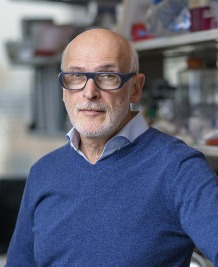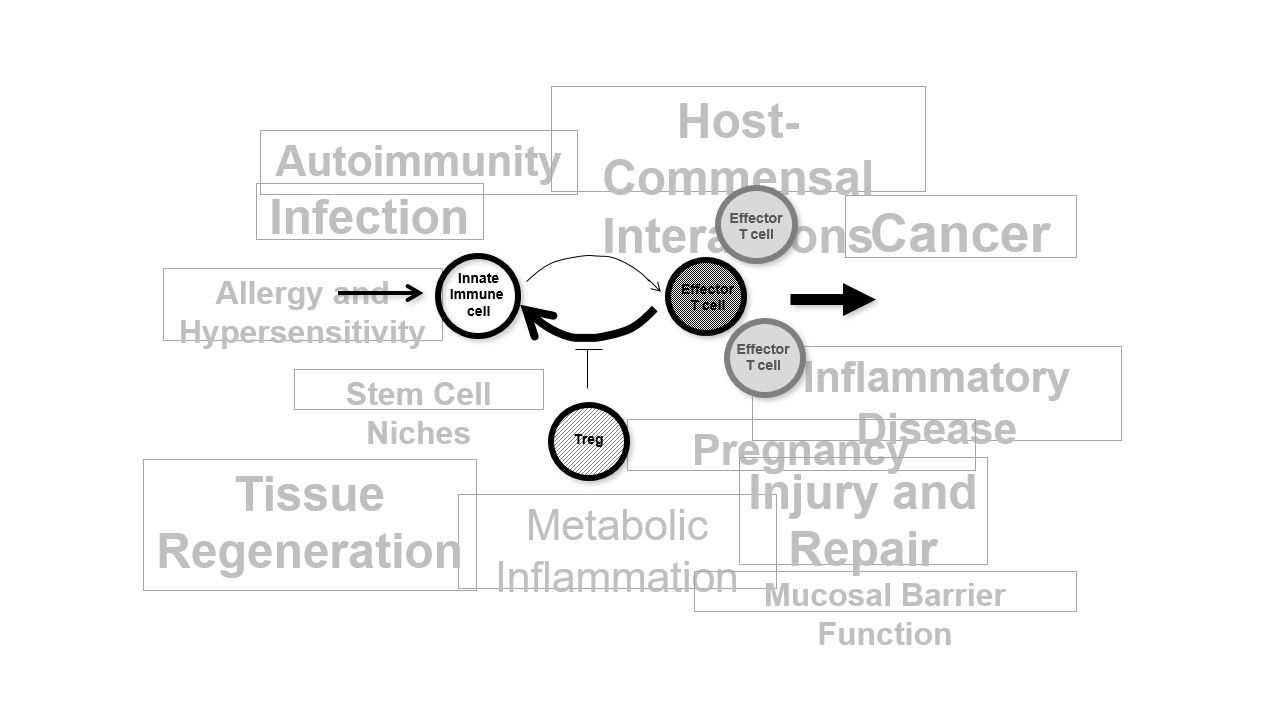
Research
The overall goals of the Rudensky laboratory research are to understand the basic mechanisms of immunoregulation with an emphasis on biology of regulatory T cells and their cellular partners and targets and their roles in autoimmunity, inflammation, tissue degeneration and injury, and cancer. Specifically, the laboratory explores the molecular and cellular mechanisms governing differentiation and function of regulatory T (Treg) cells, a specialized immune cell lineage that acts in a dominant manner to control the body’s immune responses to self-antigens, pathogens, commensal microbiota, allergens, tumors, and abiotic stresses. Rudensky’s laboratory identified the X chromosome-encoded transcription factor Foxp3 as a Treg cell lineage specification factor, elucidated its mode of action and revealed an indispensable role for Treg cells as life-long “guardians” of organismal health. These studies have established a firm genetic foundation for the phenomenon of T cell-mediated suppression of immune mediated inflammation and autoimmunity and elucidated genetic mechanisms supporting Treg cell differentiation, maintenance and function in autoimmunity, cancer, infection, commensal microbiota-host interactions, tissue repair, and pregnancy. The ongoing projects in the laboratory explore gene regulatory and molecular mechanisms underlying differentiation and function of regulatory T cells in lymphoid and non-lymphoid tissues and roles of cellular circuits they form with diverse cell types of hematopoietic and non-hematopoietic origin in health and disease. In these projects the laboratory employs a diverse range of experimental approaches including reverse genetics, protein biochemistry and proteomics, in vivo and in vitro immunological assays, highly multiplexed imaging, single cell and spatial “omics”, and computational analyses.
Current Projects:
- Treg differentiation and function
- Polytypic immune responses
- Tissular cell circuits
- Gene expression in the immune system
Bio
Alexander Rudensky received his PhD degree from the Gabrichevsky Research Institute of Epidemiology and Microbiology in Moscow. From 1990-1992, during his postdoctoral training at Yale University with the late Dr. Charles Janeway Jr, he isolated and characterized peptide antigens presented by MHC class II molecules. After completing his training, Dr. Rudensky started his independent research career in the Department of Immunology at the University of Washington becoming tenured Full Professor in 2003. He remained in Seattle till 2008 before assuming his current position at Memorial Sloan‐Kettering Cancer Center (MSKCC).

Distinctions:
- HHMI Investigator (1993- )
- Searle Scholar Award (1993)
- AAI-BD Biosciences Investigator Award, the American Association of Immunologists (1999)
- Elected Member, National Academy of Sciences (2012)
- ISI/Clarivate Highly Cited Researcher
- Elected Member, National Academy of Medicine (2015)
- Coley Award for Basic Immunology, Cancer Research Institute, New York (2015)
- Elected Fellow, American Academy of Arts and Sciences (2015)
- Thompson Reuters Citation Laureate (2015)
- Crafoord Prize, Royal Swedish Academy of Sciences (2017)
- Vilcek Prize in Biomedical Science (2018)
- AAI-ThermoFisher Meritorious Career Award, the American Association of Immunologists (2020)
- Elected Fellow, American Association of Cancer Research Academy (2022)
- Distinguished Fellow, the American Association of Immunologists (2023)
Selected Publications:
Fontenot JD, Gavin MA, Rudensky AY. (2003) Foxp3 programs the development and function of CD4+CD25+ regulatory T cells. Nature Immunol 4:330-336.
Gavin MA, Rasmussen JP, Fontenot JD, Vasta V, Manganiello VC, Beavo JA, Rudensky AY. (2007) Foxp3-dependent programme of regulatory T-cell differentiation. Nature. 445:771-5.
Arpaia N, Green JA, Moltedo B, Arvey A, Hemmers S, Yuan S, Treuting PM, Rudensky AY. A Distinct Function of Regulatory T Cells in Tissue Protection. Cell. 2015 162:1078-89. PMCID: PMC4603556.
Campbell C, McKenney PT, Konstantinovsky D, Isaeva OI, Schizas M, Verter J, Mai C, Jin WB, Guo CJ, Violante S, Ramos RJ, Cross JR, Kadaveru K, Hambor J, Rudensky AY. Bacterial metabolism of bile acids promotes generation of peripheral regulatory T cells. Nature. 2020 581:475-479.; PMCID: PMC7540721.
van der Veeken J, Campbell C, Pritykin Y, Schizas M, Verter J, Hu W, Wang ZM, Matheis F, Mucida D, Charbonnier LM, Chatila TA, Rudensky AY. Genetic tracing reveals transcription factor Foxp3-dependent and Foxp3-independent functionality of peripherally induced Treg cells. Immunity. 2022; 55:1173-1184.
